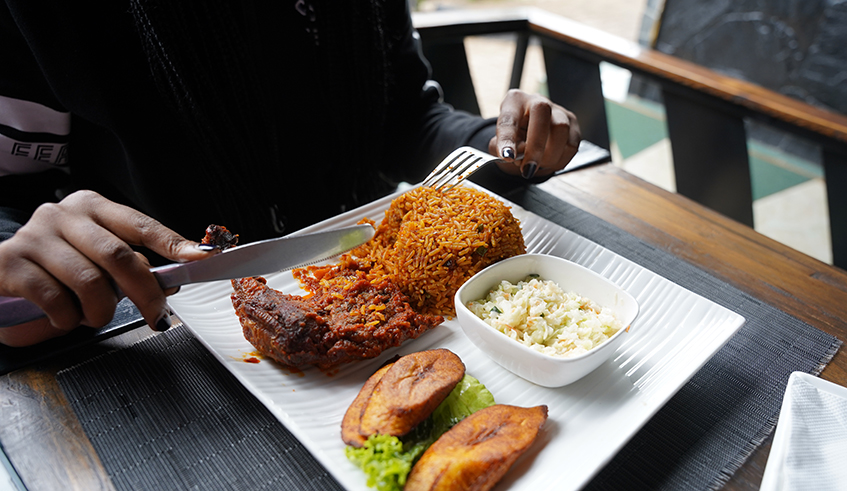

If you want to know about Rwandan authentic cuisine, attend Umuganura celebration (thanksgiving) on the first Friday of August, and make sure you don’t go to the city where they serve maize and soda. Go to places where they really serve what they grow.
While several popular dishes are made with spices, Rwandan dishes are primarily boiled and not spicy at all, and they are prepared from what is traditionally grown in their gardens — sweet potatoes, beans, maize, and cassava, among others.
For instance, Rwanda’s bean consumption is a world record where an average Rwandan consumes 34.8 kg of beans per year, but it is not surprising since beans are among the most productive crops in the country, according to the Food and Agriculture Organisation (FAO).


A view Jollof Kigali, a Nigerian cuisine restaurant where jollof rice and other meals are served at Kisimenti in Kigali on March 29,2022. Craish Bahizi
Nevertheless, beans are not all there is on our dining tables! Rice is also relatable to most Rwandans. Only a few (if at all) buffets at restaurants will not have rice.
While multiple rice dishes are common in Kigali; pilau and different dishes of fried rice, it’s only recently that Jollof rice which traditionally consists of rice, cooking oil, tomatoes and onions, among others, is gaining momentum.
Twahishije video produced by Blue Oceans Rwanda.
This dish which even has an international celebration day, August 22, is popular in countries such as Ghana, Nigeria, Senegal, Sierra Leone, Liberia and Cameroon, and each one of them claims to make the best.
For instance, Layiwola "Lai" Mohammed, Nigeria's Minister of Information and Culture got himself in trouble in April 2017 when he answered to the question "which nation makes the best jollof rice” and he replied "Senegal.” He was then accused by citizens to have "betrayed his country’s cuisine.”
While the battle for the best jollof continues, Kigalians are enjoying this dish on a regular basis.
Emmanuel Chukwu Ifeanyi is a Nigerian national living in Kigali. He moved to Rwanda a few years ago when he got married to a Rwandan woman whom they started together Jollof Kigali, a Nigerian cuisine restaurant where jollof rice and other meals are served.
"Jollof Kigali came to bridge the gap we had identified, where Nigerians and other West Africans found it hard to get their cuisine here in Kigali,” Ifeanyi told The New Times.
This couple started their business online, primarily on Instagram throughout the Covid-19 lockdown in 2020. Due to the overwhelming demand, they decided it was time to open a restaurant, despite the fact that their set trial period was a year.
"We received amazing feedback. We had so much demand that we would not even have enough sleep, so we couldn’t wait for a year to clock. Business here is encouraging,” said Ifeanyi.
He also disclosed that except for rice, tomatoes and a few other vegetables, most of the ingredients are imported from Nigeria, especially spices.
"Most Rwandans don’t eat spices, so we put it on the side for them. But generally, spices are added in the cooking process, so West Africans get the one with spices,” Ifeanyi noted, adding that only two in ten Rwandans enjoy spices.
Aline Tuyishime has been a regular since they started on Instagram. She only learnt of jollof rice from a friend who had travelled from Nigeria.
"When my friend flew in, he wanted to eat Nigerian food. We looked for them on Instagram and ordered for jollof rice, which was super delicious,” Tuyishime said, adding that she couldn’t get enough of their goat meat.
This feeling is shared with multiple people, some of whom are not even Rwandan.
Another one of their regular who preferred to be referred to as just Olawale also started ordering there when they were only still on Instagram.
"It feels good to have a taste of home in Kigali, especially with the convenience of being able to order just after getting back from work and having it delivered, and also the joy of sharing the food experience with my Rwandese friends and have them try out Nigerian meals,” Olawale, a pilot told The New Times.
Other Nigerian dishes Kigalians can’t get enough of are suya fish, Tropicana fried rice and of course, plantain and fries which a pretty common in Rwandan restaurants.
However, only a few West Africans order for jollof rice, according to Ifeanyi.
"If 20 West Africans walked in here, 19 of them are likely going to order for gari and only one would have rice,” he said.
Nevertheless, this doesn’t mean less momentum for the rice; the restaurant is named after it.
Jollof rice is without doubt another win for Kigali’s evolving metropolitan menu.


